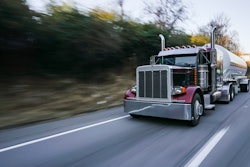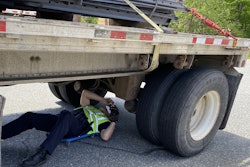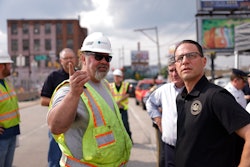Trucking news and briefs for Thursday, June 22, 2023:
Automatic emergency braking mandate proposal looming
The U.S. Department of Transportation is moving forward with a proposed rulemaking to mandate automatic emergency braking (AEB) systems on trucks with a gross vehicle weight rating of more than 10,000 pounds.
The National Highway Traffic Safety Administration (NHTSA) and Federal Motor Carrier Safety Administration (FMCSA) announced Thursday a notice of proposed rulemaking (NPRM) that, if adopted, would require AEBs on heavy trucks “that will mitigate the frequency and severity of rear-end crashes.” The move, notably, would execute a directive from the infrastructure bill that became law in 2021.
The agencies noted that they “have jointly determined not to propose retrofitting requirements” for trucks already in service.
An AEB system uses multiple sensor technologies that work together to detect a vehicle in a crash-imminent situation. The system automatically applies the brakes if the driver has not done so, or, if needed, applies more braking force to supplement the driver’s braking. The proposed standard would require the technology to work at speeds ranging between low-speed (6 mph) and high-speed (roughly 50 mph) situations.

[Related: Terrorist truck attacks spur attention to autonomous braking systems around the world]
“Establishing AEB standards is a key component of the Department’s National Roadway Safety Strategy,” said FMCSA Administrator Robin Hutcheson. “This technology can enhance the effectiveness of commercial motor vehicle crash reduction strategies and reduce roadway fatalities.”
The notice will also include a proposal to require nearly all heavy vehicles to have an electronic stability control system that meets the equipment requirements, general system operational capability requirements, and malfunction detection requirements of the Federal Motor Vehicle Safety Standard No. 136.
“Considering the effectiveness of AEB and electronic stability control technology (ESC) at avoiding these crashes, the proposed rule would conservatively prevent an estimated 19,118 crashes, save 155 lives, and reduce 8,814 non-fatal injuries annually once all vehicles covered in this rule are equipped with AEB and ESC,” the rule states. “In addition, it would eliminate 24,828 property-damage-only crashes annually.”
NHTSA earlier this month opened an investigation into reports of “false positive” activations of AEBs on Freightliner Cascadia and Western Star 5700 trucks. In the NPRM, the agencies address this by requiring that vehicles pass two test scenarios without false activation of the system.
NHTSA and FMCSA will accept comments on the proposal for 60 days once it is published in the coming days.
[Related: NHTSA investigating 'false positive' automatic braking events]
PRO Act codifying national ABC test passes Senate committee
The U.S. Senate Committee on Health, Education, Labor and Pensions (HELP) on Wednesday passed the pro-union Richard L. Trumka Protecting the Right to Organize Act of 2023 (PRO Act), which would codify the ABC independent contractor test into the National Labor Relations Act for determining worker status for the purposes of seeking to unionize.
The bill passed the committee with an 11-10 vote along party lines, with Democratic committee members voting in favor and Republican members against. By passing the committee, the bill will move to the full Senate. It would need to pass both Senate and House before being sent to President Biden’s desk to be signed into law.
Democratic committee members also voted down several amendments that would have removed the ABC test portion of the bill or similar efforts.
An amendment from Sen. Bill Cassidy (R-Louisiana), ranking member of the HELP Committee, would have protected independent contractors by codifying the Common-Law Test for worker classification that's currently in use under the Fair Labor Standards Act. The test measures how much behavioral and financial control an employer has over an individual. A worker who meets the guidelines of the test is considered to be an employee. It was also voted down along party lines, 11 to 10.
Cassidy said the recent ruling by the National Labor Relations Board to alter its independent contractor classification standard showed the board “will continue to pick away their ability to remain contractors.”
Sen. Bernie Sanders (I-Vermont), chairman of the HELP Committee, said the ABC test in the bill “ensures misclassified workers have the right to organize and fight back against unionbusting corporations,” adding that the amendment was “clearly designed to undermine the bill.”
[Related: DOL nominee Su not calling for AB 5 on national level]
An amendment from Sen. Ted Budd (R-North Carolina) would have struck entirely the bill’s definition of “employee” that adds the ABC test. In introducing the amendment on Sen. Budd’s behalf, Sen. Cassidy said the PRO Act “attempts to upend successful business models that work for many throughout the country and implement a California-style ABC test that 58% of Californians oppose.”
Cassidy added, on behalf of Budd, that “by striking this extremely flawed definition in the PRO Act, independent contractors throughout country can remain in control of their own working conditions.”
Sanders opposed the amendment, saying it would allow “unscrupulous employers to continue misclassifying workers as independent contractors” and “prevent them from exercising their constitutional right to form a union.” He added that the amendment is “a poison pill clearly designed to undermine the entire bill.”
Another amendment offered by Sen. Budd would have required a Government Accountability Office (GAO) study on the impact of the ABC test on gig workers and other independent contractors, such as leased owner-operators in trucking. It was voted down along party lines, and Sanders said Budd can request a GAO study on the topic, but “I do not believe we need to mandate such a report,” he said.
Finally, Budd offered an amendment that would have prohibited the Labor Secretary from promulgating any rule instituting the ABC test. It was also voted down along party lines, with Sanders noting that the NLRB has the responsibility of implementing the PRO Act, and not the Secretary of Labor.
[Related: National Labor Relations Board, again, alters independent contractor classification standard]
New truck stop to open at casino outside Vegas
A new $25 million truck stop and travel center is on track to open in August near Interstate 11 in Henderson, Nevada.
The Eldorado Truck Stop and Travel Center is being developed by DeSimone Gaming and is located near the company's Railroad Pass Hotel and Casino. The developer said the new truck stop is needed to add capacity to the existing one.
The new, 12,000-square-foot facility will include parking for 100 trucks, showers, truck washing, and Shell fuel. It will offer a Sonic Drive-In and Dunkin' Donuts.
There will be an around-the-clock shuttle service to the Railroad Pass Hotel and Casino. Drivers will have the option of earning free fuel and food credits by staying and playing there, according to a statement from the developer. Railroad Pass features the DeSimone Steakhouse and Iron Rail Café, along with Capriotti's Sandwich Shop and Sbarro.
[Related: The worst regions for truck parking]
Survey finds half of truckers travel with pets for ‘emotional support’
A recent survey found that plenty of truck drivers travel with their pets for emotional support.
In recognition of National Take Your Pet to Work week, Truckstop commissioned a survey of 500 U.S.-based owner-operators and found that half of the respondents travel with pets for emotional support.
As many drivers are spending more time on the road away from home, these emotional support passengers provide comfort and help to reduce loneliness. Forty-six percent of those surveyed would consider a different occupation if they could not bring along the pet.
Truckstop asked some of their customers to share their personal stories about how they found their pet companion and the therapeutic benefits their pets provide:
Constance and Jim Ross' giant Alaskan Malamute, Milo, became a military surrender after his owner was deployed overseas. Milo was transported from a rescue in Santa Barbara up to Oregon where Jim and Constance met him. He now rides with Jim.
"Milo's previous owner was in tears when he had to bring him to the rescue," said Constance. "It pulled at my heartstrings and now I know why -- Milo is such a well-trained dog full of personality and he's just happy all the time. We rely on local shipments and all the workers we work with remember Milo. He comes on short loops because the heat right now is horrible, but rides hot shot in the front seat. He's a great companion on the road."
Mike Broaddus and his Goldendoodle, Lucy, have been on the road for almost nine and a half years. The first day Mike brought her on the truck, Lucy learned how to use the mirrors to watch him work on the flatbed.
"I find that having a dog with me is welcome company," said Broaddus. "It gives us truck drivers someone to take care of and keep our minds out of our own heads. At night, Lucy lets me know if there may be anyone lurking around the truck, which is important. A dog is a deterrent for people that may have nefarious intentions.
"I believe all truck drivers should have a pet with them on the road. It's one of the main reasons I'm an owner-operator; I call the shots so I can choose to have my dog with me while I drive."










